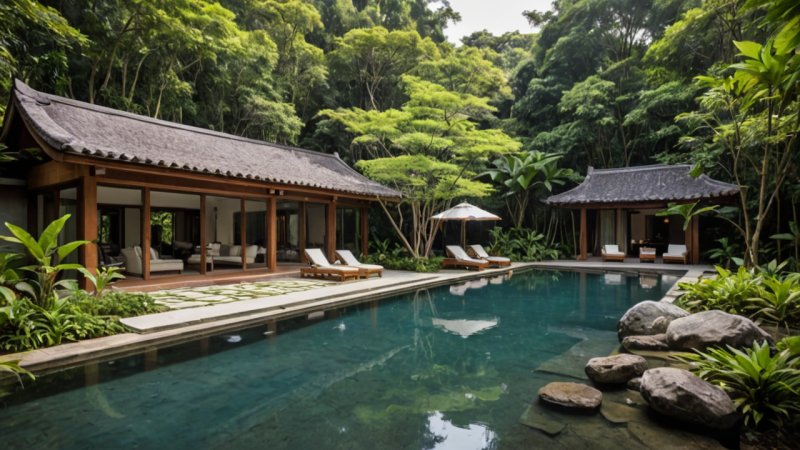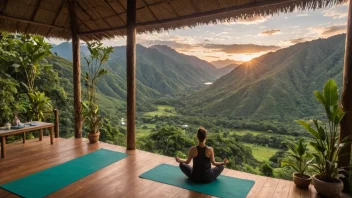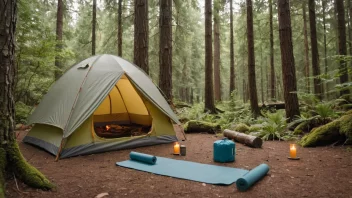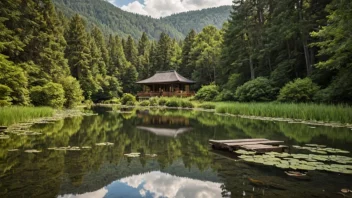In recent years, wellness retreats have surged in popularity, offering individuals a chance to escape the hustle and bustle of daily life while rejuvenating their bodies and minds. Among the various elements that contribute to the overall experience of these retreats, the ancient Chinese practice of Feng Shui has emerged as a significant influence. This article delves into the core principles of Feng Shui, its application in wellness retreats, and how it enhances the overall wellness journey for participants.
Understanding Feng Shui
Feng Shui, which translates to 'wind' and 'water', is an ancient Chinese practice that seeks to harmonize individuals with their surrounding environment. Rooted in thousands of years of philosophy and observation, Feng Shui emphasizes the importance of spatial arrangement and orientation in relation to energy flows, known as 'Qi' (pronounced 'chee'). The fundamental belief is that by arranging space in accordance with natural laws, individuals can promote health, well-being, and prosperity.
The Five Elements of Feng Shui
At the heart of Feng Shui are the five elements: Wood, Fire, Earth, Metal, and Water. Each element is associated with specific qualities and energies:
- Wood: Represents growth and vitality.
- Fire: Symbolizes passion and energy.
- Earth: Stands for stability and nourishment.
- Metal: Relates to clarity and precision.
- Water: Reflects flow and abundance.
By incorporating these elements into the design and layout of spaces, wellness retreats aim to create an environment that fosters relaxation and rejuvenation.
Feng Shui Elements in Wellness Retreats
Wellness retreats around the world have begun to embrace Feng Shui principles to enhance their offerings and provide guests with a holistic experience. Here are some key aspects of how Feng Shui is integrated into wellness retreats:
1. Site Selection and Orientation
The location of a wellness retreat plays a crucial role in its Feng Shui. Ideally, retreats are situated in natural settings that promote tranquility, such as near bodies of water or surrounded by lush greenery. Additionally, the orientation of buildings and spaces is considered to harness positive energy. For example, retreats may face south to capture sunlight, which encourages warmth and vitality.
2. Spatial Design and Flow
A key principle of Feng Shui is the concept of flow. In wellness retreats, spaces are designed to promote ease of movement and a sense of openness. This includes the use of natural light, open layouts, and unobstructed pathways. Retreats may also incorporate elements such as curved pathways or water features to enhance the energy flow and create a calming atmosphere.
3. Color Schemes and Decor
Colors play a significant role in Feng Shui, as they are associated with different elements and energies. Wellness retreats often use color schemes that align with the desired ambiance. For example, soothing blues and greens may be used to evoke calmness and tranquility, while warm reds and oranges can energize and inspire passion. Additionally, decor elements such as plants, crystals, and art can be carefully selected to enhance the overall energy of the retreat.
4. Nature Integration
Feng Shui emphasizes the importance of connecting with nature. Many wellness retreats incorporate natural elements into their design, such as indoor gardens, natural wood finishes, and stone features. This not only enhances the aesthetic value but also promotes a sense of serenity and grounding, which is essential for wellness.
5. Sound and Aroma
Sound and aroma are often overlooked but play a vital role in creating a harmonious environment. Wellness retreats may use sound therapy, such as gentle music or nature sounds, to promote relaxation. Similarly, aromatherapy with essential oils can enhance the sensory experience and create an inviting atmosphere. The careful selection of sounds and scents aligns with the Feng Shui principle of creating a balanced and harmonious space.
The Benefits of Feng Shui in Wellness Retreats
Integrating Feng Shui into wellness retreats offers a plethora of benefits for participants. Here are some key advantages:
1. Enhanced Relaxation
By creating an environment that promotes positive energy flow, guests at wellness retreats can experience deeper relaxation. Feng Shui principles help to eliminate negative energy and create spaces that foster tranquility, allowing participants to unwind and recharge.
2. Improved Mental Clarity
Feng Shui encourages an organized and clutter-free space, which can lead to improved mental clarity. In a wellness retreat setting, this can help participants focus on their wellness goals, whether that be meditation, yoga, or personal reflection.
3. Physical Well-being
The harmonious environment created through Feng Shui can also have physical benefits. Many guests report improved sleep, reduced stress levels, and enhanced overall well-being as a result of the positive energy cultivated in Feng Shui-designed spaces.
4. Increased Connection with Nature
Feng Shui promotes a strong connection with nature, which is a crucial aspect of any wellness retreat. This connection can lead to increased feelings of peace, grounding, and a sense of belonging, all of which contribute to a fulfilling wellness experience.
Case Studies of Feng Shui in Wellness Retreats
To illustrate the practical application of Feng Shui in wellness retreats, let's examine a few case studies of renowned retreats that have successfully integrated these principles:
1. The Red Mountain Resort, Utah, USA
Located in the stunning red rock canyons of Utah, The Red Mountain Resort employs Feng Shui principles in its layout and design. The retreat features open spaces that encourage natural light, a connection to the surrounding landscape, and a harmonious color palette that reflects the natural environment. Guests often rave about the tranquil atmosphere, which is attributed to the careful consideration of Feng Shui.
2. Ananda in the Himalayas, India
Ananda is a luxury wellness retreat that blends traditional Indian wellness practices with modern amenities. The retreat's architecture and landscaping are heavily influenced by Feng Shui, featuring serene water bodies, balanced elements, and natural materials. The design promotes a peaceful flow of energy throughout the property, enhancing guests' experiences during yoga and meditation sessions.
3. Kamalaya, Thailand
Kamalaya, located on the island of Koh Samui, is a wellness sanctuary that incorporates Feng Shui into its holistic approach. The retreat’s buildings are designed to harmonize with the natural landscape, and elements such as water features and lush gardens create a calming environment. The integration of Feng Shui principles here has led to a reputation for exceptional wellness experiences that focus on rejuvenation and personal growth.
Conclusion
The influence of Feng Shui in wellness retreats represents a powerful intersection of ancient wisdom and modern wellness practices. By harnessing the principles of Feng Shui, these retreats create environments that promote relaxation, mental clarity, and a strong connection with nature. As more travelers seek holistic experiences that nurture their well-being, the integration of Feng Shui in wellness retreats will continue to play a significant role in shaping the future of wellness tourism. Whether you're planning a wellness retreat or simply looking to enhance your personal space, embracing the principles of Feng Shui can lead to a more balanced and harmonious life.






